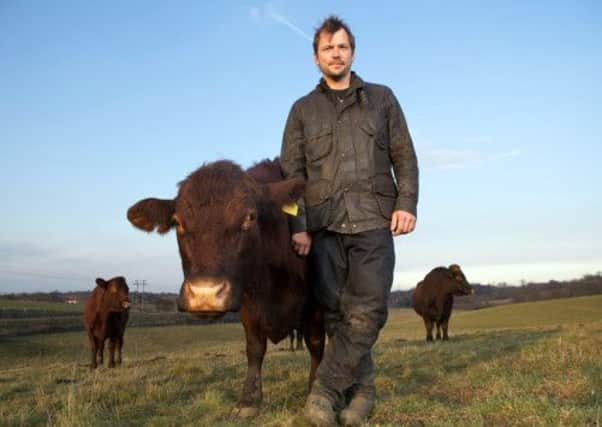Facts to chew over as campaigners aim to re-invent the veal


IT’S been appearing on the menus of some of the best restaurants in Yorkshire, from chain ventures run by celebrity chefs, like Jamie’s Italian, to fine dining stalwarts such as Van Zeller in Harrogate.
Rosé veal, the more ethically sound bi-product of the dairy farming industry, is slowly catching on with diners.
Advertisement
Hide AdAdvertisement
Hide AdUnlike its white counterpart, which is usually imported from countries where they keep calves in darkness and fed on a restrictive diet, this pinkish, homegrown alternative needn’t prick your conscience too much.
In fact, campaigners keen to get us to make the switch, focus on the fact that eating rosé veal doesn’t just mean the animal has lived in normal circumstances, it means it has been given some chance of living, period.
As highlighted last year in Jimmy Doherty’s Channel 4 documentary series, Giant Supemarket, an estimated 100,000 to 250,000 male calves are shot shortly after birth because they are useless to dairy farmers.
The alternative is that we, as consumers, create a demand for rosé veal which farmers can supply.
Advertisement
Hide AdAdvertisement
Hide AdSupermarket giants like Marks & Spencer already stock the meat and Doherty managed to convince the biggest chain of all, Tesco, to follow suit.
But, with the backing of the likes of the RSPCA and Compassion in World Farming organisation, it’s been restaurants who have been leading the charge just by serving it up on our plates. The latest restaurant to push rosé veal is The Hummingbird in Chapel Allerton, north Leeds.
Chef patron Greg Lewis said: “The big hurdle is changing people’s minds about the meat. People hear the word veal and they naturally have all these associations with cruel conditions, but rosé veal is so much more ethically sound. It’s almost cruel not to eat it.
“It’s a fantastic meat too, really tender and versatile. it makes for quite a good pork alternative, though it does have a very delicate flavour. In the past couple of weeks we’ve started offering it as a T-bone steak or in burgers, and so far it’s been really popular.
Advertisement
Hide AdAdvertisement
Hide Ad“It’s sad really, because the rise in popularity is largely due to it being trendy to eat, but having male calves killed at birth or packed abroad has always gone on, it’s only recently since it’s been pushed into the limelight that people have changed their minds. But at least they have changed their minds, which is a good thing.”
Using crates to house calves in, up until they are slaughtered at 20 weeks of age, was banned in the UK in 1990. By contrast rosé veal is essentially free range meat and the calves can live from eight months up to a year. This is a far longer life than most chickens, lambs or pigs that are bred for slaughter.
But have enough people been convinced of the ethical issues to persuade them to kick-start the whole supply/demand dynamic? It seems not. Rosé veal still only accounts for 0.1 per cent of UK meat market sales and it remains expensive. While some restaurants will pay £13.95 for a kilogram of beef, the equivalent weight of veal will cost £15.95.
But the price of beef has been rising, and many of those farmers who either shot their calves or reared them for rosé veal now find they are better off rearing bulls for slaughter.
Advertisement
Hide AdAdvertisement
Hide AdYorkshire-only food retailer Weetons of Harrogate have stocked rosé beef from a local supplier for the past five years.
“It always sold quite well too,” said food hall manager Stuart Cove. “And when the ethical aspect was brought up in the media it did help sales. But with all these things they go up and then they go down. It was a similar story when Prince Charles started the whole eating mutton bandwagon. It became popular for a while, then subsided again.”
And that posed a real problem for the likes of Newmoor Veal which operates from just outside Darlington and is one of the only veal suppliers to Yorkshire. With beef prices so high, the cattle farming business, which received substantial media attention when the rosé veal campaign started, has now ceased trading.
“The business has been in operation for five years now and it has grown and evolved - we haven’t gone bankrupt,” said one of the owners, Sarah Liddle. “But the numbers just didn’t add up.”
Advertisement
Hide AdAdvertisement
Hide Ad“We tried. As a farmer you don’t want to see an animal you’ve nurtured for months deliver a calf which is of no use and has to be killed instantly.
“But the trouble is there is always going to be a finite number of people willing to pay for a prime cut of meat, particularly when rosé veal may cost three times that of beef.”